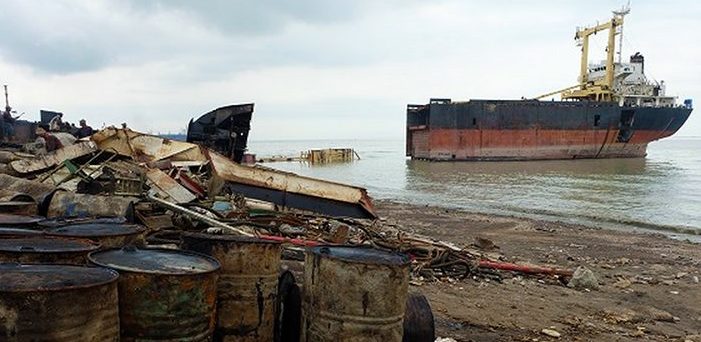EuRIC Launches Ship Recycling Working Group to Tackle EU Industry Challenges

The European Recycling Industries’ Confederation (EuRIC) has announced the formation of a new initiative aimed at addressing long-standing challenges in the ship recycling industry within the European Union. With the establishment of the European Ship Recycling Working Group (ESRG), EuRIC aims to break down existing barriers and introduce more efficient, transparent, and sustainable practices in the sector. This move comes in response to ongoing concerns surrounding the effectiveness of the 2018 EU Ship Recycling Regulation (EU SRR), which was created to ensure that ship recycling activities are conducted safely and with minimal environmental impact. Despite the regulation, obstacles remain, as outlined by EuRIC, which sees an urgent need for a restructured approach to ship recycling in Europe.
Ship Recycling and the EU’s Role
Ship recycling, often referred to as the shipbreaking industry, is a critical element of the maritime sector. It marks the final phase of a ship’s lifecycle, where vessels that have reached the end of their service are dismantled. The goal of ship recycling is to recover valuable materials such as steel, while ensuring that the process is both environmentally friendly and safe for workers. However, the ship recycling industry is plagued with several challenges, especially when it comes to European vessels, which are often sent to countries with lower regulatory standards for dismantling.
The EU SRR, which came into effect in 2018, was intended to mitigate these challenges by regulating how ships flying EU flags are dismantled, ensuring that this process occurs at facilities that meet strict environmental and safety standards. Despite these efforts, problems remain, particularly concerning compliance, efficiency, and the competitive gap between EU-based and non-EU facilities.
Recognizing these issues, EuRIC decided to take the lead in reforming the sector with the formation of the ESRG. The working group will focus on addressing existing obstacles, improving ship recycling within the EU, and advocating for a more level playing field for all actors involved.
Aims and Objectives of the ESRG
According to Antonio Barredo, the newly appointed chair of the ESRG, the main goal of the group is to enhance the ship recycling industry across the EU by making the process more transparent, efficient, and financially viable. This involves ensuring that regulations serve their intended purpose but do not create excessive administrative burdens for ship recyclers or shipowners.
“We want to ensure that regulations are effective but not too burdensome and that international actors play by the same rules,” Barredo explained. The ESRG also seeks to engage policymakers, industry stakeholders, and international partners to achieve meaningful progress in the sector.
Key to the group’s mission is ensuring that EU-listed ship recycling yards adhere to the same set of standards and that all EU-based facilities fall under the purview of existing legislation. This approach is aimed at closing any gaps in compliance, which often arise when vessels are dismantled in third-party countries that may not follow the same strict environmental and safety protocols as those in Europe.
Addressing Bureaucracy and Expanding the Scope of Regulation
One of the ESRG’s primary focuses will be to tackle the bureaucratic inefficiencies that hinder the ship recycling process. Administrative delays and high costs associated with notification procedures, for instance, have been cited as significant barriers to timely and effective ship recycling. The group will advocate for the simplification of these procedures to speed up the recycling process, reduce costs, and enable shipowners and recyclers to operate more efficiently.
In addition to streamlining bureaucracy, the ESRG plans to push for the expansion of the EU SRR. Currently, the regulation applies mainly to larger vessels that sail under an EU flag. However, this leaves out a significant portion of the global fleet, including smaller vessels and those registered under non-EU flags, which often end up in facilities with lower environmental standards.
The ESRG argues that it is essential to broaden the scope of the regulation to cover all types of ships, regardless of their size, type, or the country under whose flag they sail. The group is particularly concerned with ensuring that the ultimate financial beneficiaries of a vessel are held accountable, rather than simply focusing on the flag state. This would mean that shipowners, no matter where their vessels are registered, would have to ensure that their ships are dismantled in approved, environmentally sound facilities when they reach the end of their life.
Strengthening the European Ship Recycling Sector
Another significant priority for the ESRG is to prevent ships from leaving the EU for dismantling in non-EU facilities. Shipowners often opt for recycling yards in countries such as Bangladesh, India, and Pakistan, where regulatory oversight is weaker, costs are lower, and labour conditions are often poor. This practice not only undermines the intent of EU regulations but also weakens the European ship recycling industry.
By advocating for stricter controls and promoting investment in EU-based recycling yards, the ESRG hopes to bolster the domestic ship recycling sector. This would not only create jobs and boost the European economy but also ensure that the highest environmental and safety standards are maintained throughout the recycling process.
“The launch of our Ship Recycling Working Group is a major step forward in advocating environmentally sound dismantling of end-of-life ships in Europe and beyond,” said Julia Ettinger, EuRIC’s secretary general. She emphasized that ship recycling should play a central role in the EU’s broader circular economy objectives, which aim to minimize waste and maximize the reuse of resources.
A Call for Collaboration
EuRIC’s ESRG is calling on policymakers and industry stakeholders across Europe to support their efforts. “We need ‘all hands on deck’ to make a real impact,” Ettinger urged, stressing that collaboration between regulators, shipowners, and recyclers is crucial to the success of this initiative.
The working group hopes that by bringing together different actors within the ship recycling chain, they can foster an environment of cooperation, where shared goals around sustainability, economic growth, and regulatory compliance can be achieved.
A More Sustainable Future for Ship Recycling
The establishment of the ESRG marks a significant step forward in EuRIC’s mission to promote environmentally sustainable and economically viable recycling practices in Europe. With a clear focus on improving the efficiency and transparency of the ship recycling industry, the group aims to transform how the maritime sector handles end-of-life vessels.
By advocating for stricter regulations, simplified bureaucratic processes, and the expansion of EU ship recycling rules, the ESRG is poised to play a pivotal role in shaping the future of ship recycling in Europe and beyond.
Author: shipping inbox
shipping and maritime related web portal








